
(Reprinted from VOL 10 NO 3
JUN98 of the "Cesky Chatter")
The answer 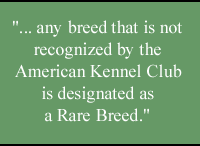 to this question is really quite simple. In the United States, any breed that is
not recognized by the American Kennel Club (AKC) is designated as a Rare Breed.
It has nothing to do with the number of dogs in this country. The number of dogs
in any Rare Breed may be anywhere from one dog to tens of thousands.
to this question is really quite simple. In the United States, any breed that is
not recognized by the American Kennel Club (AKC) is designated as a Rare Breed.
It has nothing to do with the number of dogs in this country. The number of dogs
in any Rare Breed may be anywhere from one dog to tens of thousands.
There are some examples of breeds with huge numbers
that were considered Rare Breeds until admittance into the registry of the
American Kennel Club. One of these breeds is the Chinese Shar Pei. Way back in
the early seventies, this breed was touted as being the rarest breed in the
world. Well, they were certainly not few in number by the eighties, and when the
AKC admitted the Shar Pei to their registry, ten thousand were registered on the
first day. Recently, I spoke 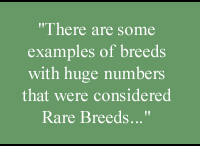 with a woman who was very involved with that breed, and she told me that when
the Shar Pei was admitted to AKC, there were 70,000 dogs in their club registry.
That is a long way from being "rare".
with a woman who was very involved with that breed, and she told me that when
the Shar Pei was admitted to AKC, there were 70,000 dogs in their club registry.
That is a long way from being "rare".
The Australian Shepherd is another example of a breed
with huge numbers prior to being admitted to the AKC. They had a very large
organization, and put on their own shows throughout the country. In fact, a
sizeable number of owners did not want their breed in AKC. They were satisfied
with their own organization and doing things their own way.
Another breed with large numbers, which was very
recently admitted to the Miscellaneous class by the AKC, is the Jack Russell
Terrier. There are several organizations representing this breed, and not all of
the groups wanted AKC recognition.
There are some AKC breeds whose numbers are quite
small, 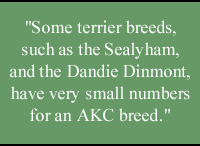 even smaller than
some rare breeds. Some terrier breeds, such as the Sealyham and the Dandie
Dinmont, have very small numbers for an AKC breed. There are many reasons for
this. Lack of interest in breeding, lack of activity by the parent club, and
lack of popularity of the breed, may be some of the causes.
even smaller than
some rare breeds. Some terrier breeds, such as the Sealyham and the Dandie
Dinmont, have very small numbers for an AKC breed. There are many reasons for
this. Lack of interest in breeding, lack of activity by the parent club, and
lack of popularity of the breed, may be some of the causes.
Some breeds were in the Miscellaneous Class of AKC for
many years, and when the AKC decided to limit the time a breed could stay in
this category, more breed clubs were encouraged to work toward full recognition
to regular classes. One breed was dropped out of the Miscellaneous Classes
because the parent club would not work toward recognition, or there was no
longer an active parent club.
The Miscellaneous Class is a step toward full
recognition.  When a breed
is first taken into AKC, it is put in this category, and the activity of the
breed is watched. If there is a lot of activity (showing in conformation,
obedience, agility, etc.), AKC works with the parent club for full recognition
to a particular group. In the case of the Cesky Terrier, that will be the
Terrier Group. A dog can not achieve a championship with AKC while in the
Miscellaneous Class, and all breeds are shown together. Most breeds are now
staying in this category for only a year or two, instead of the many years some
breeds stayed in this class in prior years.
When a breed
is first taken into AKC, it is put in this category, and the activity of the
breed is watched. If there is a lot of activity (showing in conformation,
obedience, agility, etc.), AKC works with the parent club for full recognition
to a particular group. In the case of the Cesky Terrier, that will be the
Terrier Group. A dog can not achieve a championship with AKC while in the
Miscellaneous Class, and all breeds are shown together. Most breeds are now
staying in this category for only a year or two, instead of the many years some
breeds stayed in this class in prior years.
Being "rare" does not necessarily make
anything valuable. 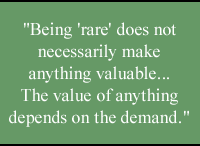 There
are rare gems, and rare diseases. The value of anything depends on the demand.
Some Rare Breeds become very much in demand, and others never get much attention
from the public. I have had calls from people who do not know anything about the
Cesky Terrier. They sometimes ask if they are "AKC", and when I say
that they are not yet recognized, some of these people seem to feel that if a
breed is not "AKC", they are not valuable. So, the value of a
"rare breed", or any breed, is in the perception of the buyer.
There
are rare gems, and rare diseases. The value of anything depends on the demand.
Some Rare Breeds become very much in demand, and others never get much attention
from the public. I have had calls from people who do not know anything about the
Cesky Terrier. They sometimes ask if they are "AKC", and when I say
that they are not yet recognized, some of these people seem to feel that if a
breed is not "AKC", they are not valuable. So, the value of a
"rare breed", or any breed, is in the perception of the buyer.
When we started in this breed, over 10 years ago, it
was almost totally unknown in this country. It took us ten months to place one
of the male pups from our first litter. I was prepared for this, and, as time
went on, it became much easier to place pups. Now, we have far more inquiries
than pups.
A Rare Breed, like the Cesky Terrier, needs a lot of
publicity. We have personal ads in three publications, on our NCTC website, and
on our NCTC breeders' list. The Cesky Terrier is not a breed that you can sell
in your neighborhood, and probably not even in your hometown. We have placed one
dog in our town, and two others in our state. All the others went to other
states, and some went to Canada.
Pricing of Rare Breeds can range from reasonable to
ridiculous. Since we attend a number of Rare Breed shows, and have also shown
AKC breeds, I have done my own research on pricing of pups. 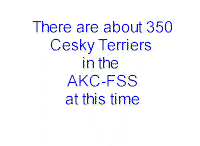 When we got into the Cesky Terrier breed, we paid a lot for our first dogs. We
decided that we would price our pups in line with the pricing of other Terrier
breeds that we knew in AKC. We also imported several Cesky Terriers from
different European countries, and found that the first dogs we imported were
extremely overpriced. I have found that some Rare Breeds are priced similarly to
our Cesky Terriers, and some are priced much higher. Although we could sell our
pups for much more, we decided that we did not want to attract people who may
think they could make a fortune selling Cesky Terrier pups. There have already
been a few "breeders" in this breed who obviously got into the breed
thinking they would make a lot of money. Most of these people are, thankfully,
already "out" of the breed. All breeding should be an attempt to
improve the breed.
When we got into the Cesky Terrier breed, we paid a lot for our first dogs. We
decided that we would price our pups in line with the pricing of other Terrier
breeds that we knew in AKC. We also imported several Cesky Terriers from
different European countries, and found that the first dogs we imported were
extremely overpriced. I have found that some Rare Breeds are priced similarly to
our Cesky Terriers, and some are priced much higher. Although we could sell our
pups for much more, we decided that we did not want to attract people who may
think they could make a fortune selling Cesky Terrier pups. There have already
been a few "breeders" in this breed who obviously got into the breed
thinking they would make a lot of money. Most of these people are, thankfully,
already "out" of the breed. All breeding should be an attempt to
improve the breed.
There are about 300 Cesky Terriers in the AKC-FSS
registry at this time. We recently learned that another club will soon add the
dogs in their registry to the Foundation Stock Service registry. When the number
reaches 300, AKC should talk seriously about admittance to the Miscellaneous
Class. So, we will probably stay in the Rare Breed category for a few more
years.
Those of use who own one or more charming Cesky
Terriers know that they are rare and valuable. They will always be rare in the
world of dogs because they are wonderful, adorable, and intelligent companions.
(Copyright 1998 by Editor: Lori
Moody and NCTC)

